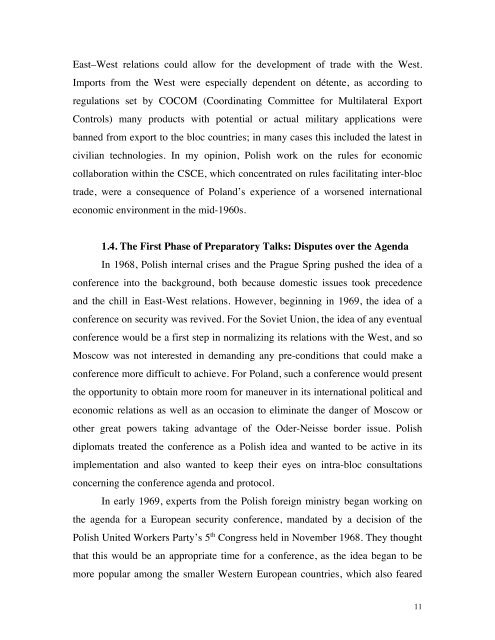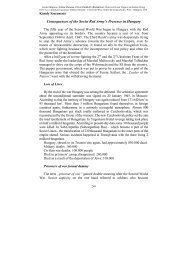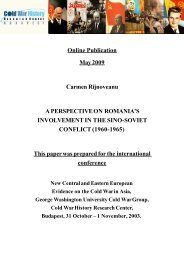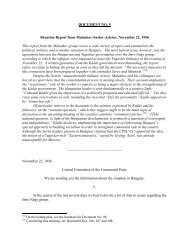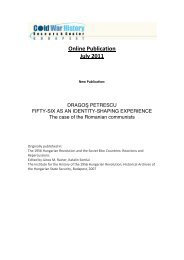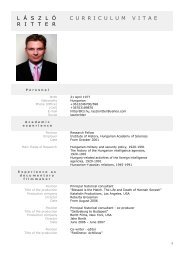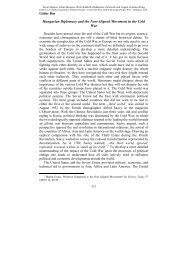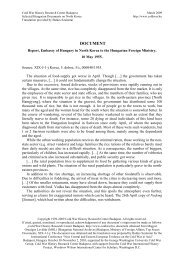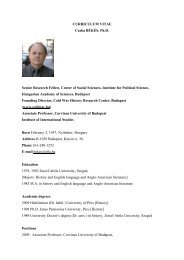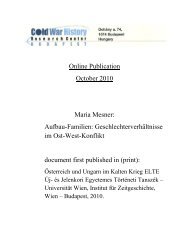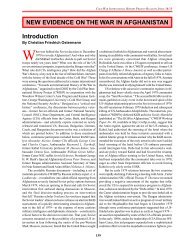Hope and Reality: Poland and the Conference on Security and ...
Hope and Reality: Poland and the Conference on Security and ...
Hope and Reality: Poland and the Conference on Security and ...
Create successful ePaper yourself
Turn your PDF publications into a flip-book with our unique Google optimized e-Paper software.
East–West relati<strong>on</strong>s could allow for <str<strong>on</strong>g>the</str<strong>on</strong>g> development of trade with <str<strong>on</strong>g>the</str<strong>on</strong>g> West.Imports from <str<strong>on</strong>g>the</str<strong>on</strong>g> West were especially dependent <strong>on</strong> détente, as according toregulati<strong>on</strong>s set by COCOM (Coordinating Committee for Multilateral ExportC<strong>on</strong>trols) many products with potential or actual military applicati<strong>on</strong>s werebanned from export to <str<strong>on</strong>g>the</str<strong>on</strong>g> bloc countries; in many cases this included <str<strong>on</strong>g>the</str<strong>on</strong>g> latest incivilian technologies. In my opini<strong>on</strong>, Polish work <strong>on</strong> <str<strong>on</strong>g>the</str<strong>on</strong>g> rules for ec<strong>on</strong>omiccollaborati<strong>on</strong> within <str<strong>on</strong>g>the</str<strong>on</strong>g> CSCE, which c<strong>on</strong>centrated <strong>on</strong> rules facilitating inter-bloctrade, were a c<strong>on</strong>sequence of Pol<str<strong>on</strong>g>and</str<strong>on</strong>g>’s experience of a worsened internati<strong>on</strong>alec<strong>on</strong>omic envir<strong>on</strong>ment in <str<strong>on</strong>g>the</str<strong>on</strong>g> mid-1960s.1.4. The First Phase of Preparatory Talks: Disputes over <str<strong>on</strong>g>the</str<strong>on</strong>g> AgendaIn 1968, Polish internal crises <str<strong>on</strong>g>and</str<strong>on</strong>g> <str<strong>on</strong>g>the</str<strong>on</strong>g> Prague Spring pushed <str<strong>on</strong>g>the</str<strong>on</strong>g> idea of ac<strong>on</strong>ference into <str<strong>on</strong>g>the</str<strong>on</strong>g> background, both because domestic issues took precedence<str<strong>on</strong>g>and</str<strong>on</strong>g> <str<strong>on</strong>g>the</str<strong>on</strong>g> chill in East-West relati<strong>on</strong>s. However, beginning in 1969, <str<strong>on</strong>g>the</str<strong>on</strong>g> idea of ac<strong>on</strong>ference <strong>on</strong> security was revived. For <str<strong>on</strong>g>the</str<strong>on</strong>g> Soviet Uni<strong>on</strong>, <str<strong>on</strong>g>the</str<strong>on</strong>g> idea of any eventualc<strong>on</strong>ference would be a first step in normalizing its relati<strong>on</strong>s with <str<strong>on</strong>g>the</str<strong>on</strong>g> West, <str<strong>on</strong>g>and</str<strong>on</strong>g> soMoscow was not interested in dem<str<strong>on</strong>g>and</str<strong>on</strong>g>ing any pre-c<strong>on</strong>diti<strong>on</strong>s that could make ac<strong>on</strong>ference more difficult to achieve. For Pol<str<strong>on</strong>g>and</str<strong>on</strong>g>, such a c<strong>on</strong>ference would present<str<strong>on</strong>g>the</str<strong>on</strong>g> opportunity to obtain more room for maneuver in its internati<strong>on</strong>al political <str<strong>on</strong>g>and</str<strong>on</strong>g>ec<strong>on</strong>omic relati<strong>on</strong>s as well as an occasi<strong>on</strong> to eliminate <str<strong>on</strong>g>the</str<strong>on</strong>g> danger of Moscow oro<str<strong>on</strong>g>the</str<strong>on</strong>g>r great powers taking advantage of <str<strong>on</strong>g>the</str<strong>on</strong>g> Oder-Neisse border issue. Polishdiplomats treated <str<strong>on</strong>g>the</str<strong>on</strong>g> c<strong>on</strong>ference as a Polish idea <str<strong>on</strong>g>and</str<strong>on</strong>g> wanted to be active in itsimplementati<strong>on</strong> <str<strong>on</strong>g>and</str<strong>on</strong>g> also wanted to keep <str<strong>on</strong>g>the</str<strong>on</strong>g>ir eyes <strong>on</strong> intra-bloc c<strong>on</strong>sultati<strong>on</strong>sc<strong>on</strong>cerning <str<strong>on</strong>g>the</str<strong>on</strong>g> c<strong>on</strong>ference agenda <str<strong>on</strong>g>and</str<strong>on</strong>g> protocol.In early 1969, experts from <str<strong>on</strong>g>the</str<strong>on</strong>g> Polish foreign ministry began working <strong>on</strong><str<strong>on</strong>g>the</str<strong>on</strong>g> agenda for a European security c<strong>on</strong>ference, m<str<strong>on</strong>g>and</str<strong>on</strong>g>ated by a decisi<strong>on</strong> of <str<strong>on</strong>g>the</str<strong>on</strong>g>Polish United Workers Party’s 5 th C<strong>on</strong>gress held in November 1968. They thoughtthat this would be an appropriate time for a c<strong>on</strong>ference, as <str<strong>on</strong>g>the</str<strong>on</strong>g> idea began to bemore popular am<strong>on</strong>g <str<strong>on</strong>g>the</str<strong>on</strong>g> smaller Western European countries, which also feared11


